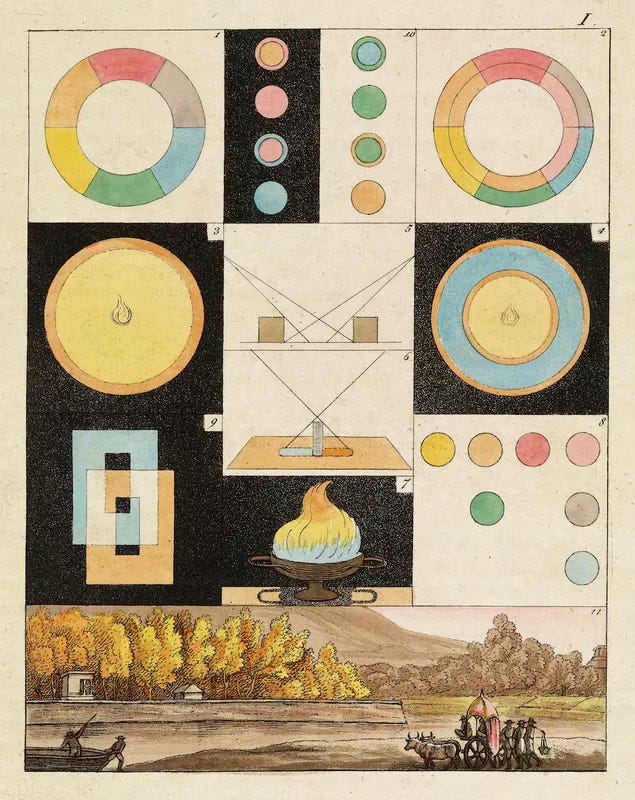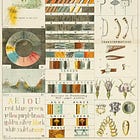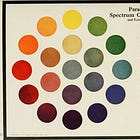Fin: I was/I am/I will always be changing my mind
And I hope that's one thing we can agree about
We have come to the last post in this series, which came sooner than I expected when I began the series and also feels terribly late in the grand scheme of things.
When I wrote the introduction, Nate said something like, “It would probably be good to let the pacing of the series reflect in some ways the pacing of this shift for our family.” I understood his point. It is not generous or kind to throw a bucket of ice cold water over someone’s head and compare it to a slow, purposeful cold plunge in which you submerged your own appendages separately and at your own speed. But also, there’s no way I was going to take seven years to write this series. I hope this has been some sort of medium.
I said when I began the series that no one would agree with me, and despite many of your protestations that you did agree with me, I still maintain that none of us are in complete and total agreement—and I think that’s a good thing.
I have views on marriage, sex, trans rights, the terms we use, and the human body in general that I haven’t shared here and have no plans to share here. Why? Despite some saying that “clarity is kindness,” I believe that it is an even greater kindness to have these conversations in person, perhaps over Himalayan curries and Cauliflower Manchurian, as we and some friends did the other night. I have views on these things that will get me canceled faster than you can say J.K. Rowling or Jimmy Kimmel. These views are not the most important thing about me, nor are they the most important things about anyone.
Again, I’m interested in human affirming care and the absolute priority (for me) in being a human affirming person is proximity to the person I’m trying to care for. Lack of proximity to the humans we say we’re advocating for is just propaganda or publicity—there might be a place for it, but it’s not what I’m trying to do with my life.1 I think this is the source of all kinds of wars, crimes, and others travesties.
Instead, as I wrote in the introduction to this series,
“I’ve never been after a thesis for myself on the matter. What I’m interested in is the ways this issue intersects with our faith, and our view of God, ourselves, and others. I’m interested in what our preoccupation with sex, sexuality, marriage, love, the human body all says about the character of God, the image of God, our belief in God, the character and beingness of humans, and our understanding of what faith, hope, and love is.
In other words, I’m asking the questions: why does this matter? and what about it matters to me?”
The lack of a thesis may have disappointed some of you who were looking for a “Biblical Defense™ of Gay Marriage” or “Ten Reasons Why Gender Affirming Surgery is Right/Wrong” or Whatever Other Clickbait Gets Your Gander. I’ve never been after that. Never. There might be a place for pieces like those but not on Sayable.

Instead, I brought you along as I explored my own concepts of God and God’s character and why, in order to keep my belief in God, I have to believe that God is limitless and therefore is not bound by the constraints of time, space, or reason. I believe that God is always changing, growing wider, bigger, and more full of goodness, billowing out exponentially and eternally. And I believe that humans were created in God’s image to change too. 👇🏼
Then I wrote about my faith in God and how, in order to keep my faith in God tethered to God, I have to let my intellectual doubts surface, to face them head on, and let them take whatever time they need to resolve. And therefore I have to let the faith of other people be whatever it is without demanding it look, act, or submit to my own journey of faith. 👇🏼
After this, I brought you along on my journey through church from birth to today. I shared about how my unique story conditioned me in certain ways and with certain postures that made me tender to those who may feel a certain way about church and, in particular, with evangelical Christians. I wrote about the most important thing for me in the church today and why this is a deal breaker for me in most evangelical churches. 👇🏼
Next, I wrote about the politics of all of this, how we use certain words, fly certain flags, what they mean, what they might mean to different people and why I find many of them unhelpful (for me). I gave my definition of how I use the word affirming and was surprised absolutely zero by the ways that other people used the word in the comment section. It proved my point. 👇🏼
After that, I wrote about community and the role that community has played—and could not play—in our process over the past seven years. I wrote about how changing our minds on this has meant the loss of things we felt were deeply necessary and also the gain of other things we never imagined were possible—or good—before. I wrote about my own journey from wanting mere goodness to pursuing wholeness. 👇🏼
Next, I wrote about my marriage and the ways I have been changed by the love of God and Nate, and how I am resolved to not withhold the possibility of that kind of love from anyone in the world. I wrote about evangelical sex obsession, the ways patriarchy and the theology of headship have train-wrecked marriage, sex, and women. And I wrote about how complementarian theology (and I myself) twisted Adam’s words about Eve into something they are not. 👇🏼
Finally, I wrote about my own story around sexuality, humanness, the body in general, dysmorphia, dysphoria, and what it means to care for the individual and their own body, history, scars, and sense of wholeness. This was the most personal piece of the series and even though it was last, it is the one that contains the threads of why these subjects are so important to me. 👇🏼
Now, at the end of it all, I know there are some of you out there who are shaking their heads for a few different reasons.
You’ve been here for a long time, come to expect a certain thing from me, and now you feel I’m just another in a long line of people who’ve disappointed you and whose books you will have to trash.
You’ve been here for a long time, been on a similar journey to me, and were hoping to find a sort of belief statement that you could co-opt for yourself, a shorthand for what you believe now too.
You’ve only been here for this series and were looking for another gotcha moment that either proves your point about X or Y or Z. Confirmation bias for or against people like me.
~ To those in the first group, I bid you peace to the life you feel called to live. If trashing the books of people [or the people themselves] who’ve been companions to you in the past but with whom you have disagreements feels congruent with the person you are and the life you want to live, you are free to do that. I’ve done it plenty myself.
~To the second group, I hope you’re able to see this series like the tip of an iceberg and the iceberg is your own life. Plumb the depths of all of this, resist the urge to believe something just because someone else does. Question yourself more than you question others. The work is good not because the outcome itself is good, but because the work it does in you is good.
~ To the final group, thank you for being here for the series. Sayable is less interested in proving anyone’s point (including mine) and more about making the unsaid sayable. It’s about finding common ground in gray spaces, commonality in liminality, and communion amidst the isolation of being between two poles.
There is a last group of people, though, and that is the rest of you. The 65%. My people =)
I said at the beginning of this series that
The deeply conservative and wildly progressive often have far more in common than they would like to believe about themselves. Both participate in a lack of toleration for not only the other far extreme (which I think is sometimes healthy), but also for anyone who exists in the great swath between them—which 2/3s of Americans do. If you don’t agree exactly with them, you become an enemy to them and their ideals, you are a danger to them and the society they want to have around them, you are to be shut up, shut down, shut out, shunned, and your work is to be boycotted, removed from circulation, or shamed in the public square.
I’m writing this based on the loose belief that you are not either of those extremes, that you instead fall in that 65%ish. Most of you are very comfortable with the gray space that exists between the polar ends of belief in our culture today, less interested in shutting down different voices/perspectives and more in listening to them and learning from them, often so it can help you articulate more of where you are yourself.
To you I want to say thank you for being here, for still being here. I haven’t figured everything out, I’m still changing my mind, I’m still unsure about many things. More than ever, though, I’m resolved to continue being honest with myself about where I am, to live with integrity with my own self in order that I can live more wholly as a member of this fractured world.
This is my only aim in life these days: be whole, be here, be honest. Don’t fragment, don’t project, don’t pretend.
So thank you, thank you for being here with me. I think this is how we heal the world.
“Is she going to refer us again to Wendell Berry’s Health is Membership?”
“Yes. Yes she is.”













I think I actually was expecting more of a deeper dive into certain subjects, but honestly, I really appreciated your take on everything. It forced me to pause and think. To reconsider and ask more questions. To give more grace, to grow in more humility. To consider that God is always changing is new to me! And I also appreciate how you said it’s not always best to share everything. I am a transparent person, but over the past 6 years my faith has become more personal, more quiet. Not so out loud. Haven’t been in a comfortable place in my faith in a long while. I suppose that is good. But I truly do appreciate you and work. Thank you, Lore!
Thanks for this series. These posts helped me think through things from a different perspective.
Your post on "affirming" inadvertently helped prep me for a conversation I had the next day where I was asked about my opinion about being affirming. It ended up being a good conversation about definitions and how the term needs to not merely mean "I support same-sex marriage."
Like some of the other commenters, I was expecting more into-the-weeds theology, but I am pleasantly surprised at the route this series took, the approach you have to these topics, and how uncontroversial I found the series to be. The most controversial bit was definitely the changeability of God, and I let my thoughts be known in my comments on that post :)
Small aside, the "clarity is kindness" is 100% true at a larger level -- I work part-time at a church and this is one of those topics where it's good to be upfront with newcomers as to how they can expect our church to handle the topic of sexuality. As a queer person, I'd *hate* for another queer person to hit a point with my church where the tables turn and there is unexpected confusion. That said, having such "statements" can tend to shut down needed in-person conversations, which is really too bad.
Thanks again for your willingness to take the time and energy to do this series. I know it took a toll on you, so I hope you can rest and enjoy the beauty of autumn!